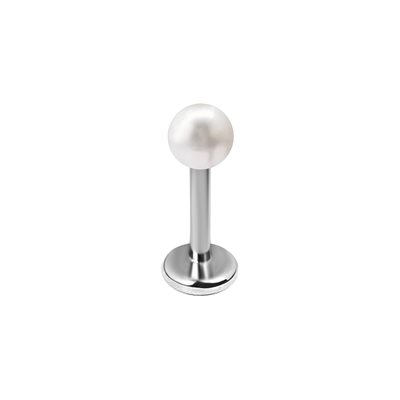Labret with fresh water pearl
Suggested Retail price: CAD $32.00
- Main material : Surgical Steel (316L-ASTM F138)
- Secondary material : Cultured freshwater pearl
- PVD Coating : None
- Gem type : None
- Threading : External
- Classification : Labret
- Availability: In stock
Surgical Steel 316
SS316L is a surgical implant grade, which is the most used material for Body Jewelry. The two most common standards that apply to body jewelry made of steel are ASTM F138 and ISO 5832-1 which describe the qualities of steel for surgical implants.
The element in stainless steel that causes allergic reactions in some people is nickel. Polishing the jewelry to a mirror like luster results in a protective layer of chromium oxide, which reduces the release of the Nickel content into the tissue. Surgical Steel can be sterilized in an autoclave.
Check certificate and nickel release certificate for more info. You can also check the latest European directive regarding the use of nickel for body Jewelry.
MAGNETISM IN SURGICAL STEEL 316L
We had some returning questions regarding magnetism in Surgical Steel 316L. Some people still believe that if the steel is magnetic then it is not surgical steel. We would like to emphasize here one more time that this is not true. Stainless Steel 316L is a low-carbon form of 316 steel. Although it is non-magnetic when produced, it may become magnetic when worked.
Cultured Freshwater Pearls
Cultured Freshwater Pearls get their name from being cultured in freshwater lake or pond farms, with China and the United States are the main sources.
Nucleation is the surgical procedure to implant a foreign object into the oyster to activate the secretion process. This cultivation period takes years to produce pearls. Generally, 2-7 years in freshwater, depending on the host’s natural habitat. The longer the process of cultivation, the bigger the pearl size expected.
A slight variation of colour and shape it’s a sign of their individuality and naturally occurring. Their unique shapes and wide range of colors combined with their attractive prices and charming character, have made them a favorite among jewelry designers, shoppers and pearl connoisseurs alike.
How to Care for Cultured Freshwater Pearls
- After every wear, wipe any build up oil or other substances on pearls with a nonabrasive cloth.
- If your pearl is visibly stained, wipe it with a soft cloth dipped in a mixture of lukewarm water and mild soap. Do not submerge pearl in water as the collateral material attached to the pearl may not do well with the liquid solution.
- Dry pearl thoroughly before storing in flat, fabric-lined case to avoid scratching the soft pearl surface.
- Never clean pearls with steam or ultrasonic jewelry cleaner as it will likely damage the surface nacre of the pearl.


